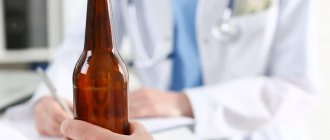Home>Articles>Alcoholic depression, how to notice and treat a dangerous condition in time
quick menu (hide)
- What is alcoholic depression, features and danger of the pathological condition
- Causes of alcoholic depression
- Symptoms indicating the development of the disease
- Diagnosis and treatment of alcoholic depression
- Is it possible to cope with alcoholic depression on your own?
Excessive drinking of alcohol is very dangerous, because with prolonged exposure to ethyl alcohol, a person develops alcoholic depression. This is a fairly serious condition, which from a medical point of view is classified as a mental disorder. This type of depression can lead to pronounced psychosis during the abstinence period (hangover).
What is alcoholic depression, features and danger of the pathological condition
Before figuring out how to get rid of alcoholic depression, you need to understand what the pathological process is. This condition most often occurs after binge drinking, with a sudden cessation of alcohol consumption. The development of a pathological phenomenon accompanied by psychological disorders is directly influenced by severe intoxication of the body, provoked by excessive amounts of alcohol. According to its condition, post-alcohol depressive syndrome is divided into 2 types:
- Short term disorder. This form is characterized by a milder course. The pathological condition is caused by alcoholic beverages consumed by a person in large quantities and the hangover syndrome provoked by them. The patient is in apathy, tormented by a feeling of guilt for drinking a large amount of alcohol and at the same time suffering from the unpleasant physiological effects of a hangover.
- Long-term severe depression. The condition is similar to the previous one, but occurs after the drunken person has given up alcohol, and in most cases occurs in a very severe form. The longer the binge lasted, the worse the patient felt and the more time it took to normalize well-being. Usually, to alleviate post-alcohol depressive syndrome, the help of a narcologist is required.
note
The state of such depression is extremely dangerous, because prolonged consumption of alcoholic beverages leads to mental trauma. As a rule, depression that occurs against the background of alcoholism provokes serious family problems, impaired social adaptation, and the emergence of suicidal intentions. Depression after a long period of drinking, when a person suffering from a hangover is severely weakened morally and physically, can provoke repeated binge drinking, which will provoke more severe consequences.
How to help the body?
An intense attack of fear, accompanied by somatic reactions, negatively affects the patient. Therefore, you definitely need to know what to do if you have panic attacks after drinking alcohol. This problem can be solved in several ways.
Fast detoxification
The body will recover on its own in about 2-3 days. A number of simple steps will help speed up this process and significantly reduce the risk of developing panic attacks.
The patient will need:
- Replenish your supply of vitamins. This is best done using IVs or intramuscular injections. If this is not possible, vitamins in tablet form are also suitable.
- Actively cleanse the body. Increase your consumption of mineral water. It is also useful to drink tea with honey, berry fruit drinks and compotes. The recommended daily volume of fluid for a hangover is from 2.5 to 3 liters.
- Connect medications. Pharmacies sell many drugs for hangover syndrome (Limontar, AlkaSeltzer, Pohmelin, etc.). Before use, please read the instructions.
- Cold and hot shower. It will help you cheer up and restore your muscles to their former tone. Alcohol metabolites are also excreted through the upper layer of the epidermis.
A doctor's consultation is required. The specialist will select effective drugs. Panic attacks can be controlled with antidepressants and tranquilizers. You cannot take them without permission.
Breathing exercises
They will help you fight anxiety without medications. This is the simplest thing a person can do in case of intense manifestation of fear.
At the first sign of an attack, you can try the following exercises:
- Belly breathing. Squat down, leaning your back on something stable. Close your eyes, relax, take a slow and deep breath. Hold your breath for 3-4 seconds, exhale slowly. Repeat about 4-5 times.
- Palm breathing. Starting position, as in the first case. Fold your palms into a boat and press them to your mouth and nose. Do the exercise 3-4 times.
- Breathing with a paper bag. The principle is the same. The palms are replaced with a package.
These exercises will help normalize the level of carbon dioxide in the blood and also prevent it from becoming too quickly saturated with oxygen. This will help you calm down.
Causes of alcoholic depression
Relatives of drinkers often wonder why an alcohol-dependent person often falls into an apathetic state. As experts explain, depression in this case is a so-called method of “self-flagellation” - a person who decides to stop drinking suffers because of the problems that arose during the binge. The main reason that provokes the development of a depressive state against the background of alcohol abuse is disruption of the functioning of the nervous system and brain, which arose due to intoxication of the body with ethanol products. Even a small amount of ethyl alcohol activates GABA inhibitors (gamma-aminobutyric acid, an important inhibitory neurotransmitter of the central nervous system), which provokes the occurrence of apathetic states of varying duration in the drinker.
Risk factors that can cause the development of post-alcohol mental disorder:
- social and everyday problems;
- uncontrollable craving for alcohol;
- metabolic disorders (metabolism);
- dysfunction of the central nervous system and brain;
- development of abstinence, acute hangover, when giving up alcohol.,
As the clinical practice of narcologists shows, constant drinking of large quantities of alcohol weakens a person’s nervous system, but does not relieve him of the burden of existing problems, but only increases them. With prolonged use of alcohol, dependence on ethanol occurs on a psychological and physical level. A person who decides to stop faces the problem of losing the colors of life - he seems to have stopped drinking, goes to work, behaves as usual before binge drinking, but everything around him seems boring and gray. Such emotional depression, an apathetic state, is post-alcohol depression. If a person is not helped at this time, he may begin a new binge.
The mechanism of panic attacks
Many people wonder why panic attacks occur after drinking alcohol? This is due to the final effect of the components of alcohol. A hangover is a powerful stressor for the body. As a result, adrenaline is released . This is a hormone produced by the adrenal glands. With its excess, tachycardia, hypertension begins, breathing quickens and an inexplicable feeling of fear appears.
As the concentration of adrenaline increases, the oxygen content in the blood also increases. Blood vessels constrict, which only increases panic. The person feels empty and lost. Sometimes aggression appears. Symptoms get progressively worse. The duration of attacks varies: from 15-20 minutes to 1-1.5 hours. The danger is that they are repeated many times. At such moments, a person urgently needs help.
Symptoms indicating the development of the disease
As a rule, this type of pathological phenomenon has certain clinical signs that resemble a manic-depressive state. Mental problems for an alcohol-dependent person who has stopped drinking can continue for up to six months without medical help. to independently determine that a person has a post-alcoholic depressive state, because the symptoms of alcoholic depression that have just begun to develop are moderately pronounced. The occurrence of severe affective disorders is very rare. The main complaints of patients faced with this pathological phenomenon include:
- Suicidal thoughts - their appearance is directly related to the fact that a long-term drinker loses contact with society and becomes unclaimed both professionally and socially.
- Reduced instinct of self-preservation - alcohol-dependent people during depressive syndrome do not perceive danger well and can provoke an accident because they become inattentive to their surroundings.
- Slowing down of the rhythm of life - a person in this state prefers to spend time alone, sitting in front of a computer or TV, because he feels a pronounced feeling of depression, guilt before others and himself.
- Loss of the meaning of life - against the background of alcohol addiction, everything around begins to seem monotonous, boring and uninteresting, the feeling of joy completely disappears, and the patient receives satisfaction only after drinking a new portion of alcohol.
The above clinical signs appear simultaneously with physiological disorders - a person develops signs of dyspepsia (nausea and vomiting), eating disorders , libido decreases, and the activity of the cardiovascular system changes.
If a person develops alcoholic depression, the symptoms and treatment will be completely similar to those of a neurotic depressive state. In order for the patient to cope with a dangerous mental condition as quickly as possible, relatives must persuade him to see a specialist and undergo a special course of therapy. However, in most cases this is difficult , because the alcoholic does not admit that he is sick.
A few more tips
In case of panic attacks due to a hangover, you should lie down on a comfortable sofa, relax your body muscles, and try to breathe evenly. Also, treatment of panic attacks after alcohol should include drinking sedatives or herbal tea, cleansing the body of toxins. It is recommended to listen to pleasant , calm music or sounds of nature. You can sign up for a massage. Communication with loved ones, favorite hobbies, and walks in the fresh air will also help you distract from anxious thoughts.
As for the prevention of panic attacks, it is necessary to stop drinking alcohol (in whole or in part). Watch your diet and exercise. Spend more time outdoors, watch your sleep (it should be at least 8-10 hours). Visit an experienced neuropsychiatrist.
Panic attacks cannot be ignored.
Associated symptoms will only intensify over time. The support of loved ones is of great importance in the fight against attacks. It’s enough just to be nearby, talk , calm. Reproaches will only make the situation worse. You should remain as calm as possible. Instead of scandals, you need to convince your loved one to see a narcologist and change their lifestyle. Without this, all efforts will be in vain.
Diagnosis and treatment of alcoholic depression
Only a specialist can make a diagnosis of post-alcohol psychological disorders based on differentiation with other types of depressive syndromes that have similar clinical signs. To confirm the diagnosis, the doctor analyzes the patient’s complaints and conducts a physical examination. Only after clarifying the nature of the pathological process will a specialist be able to decide how to cope with alcoholic depression in a specific clinical case and select an appropriate treatment plan.
The main difficulty when choosing a therapeutic regimen is the inadequate attitude of most patients to their condition. They do not want to realize that it was not depression that caused the binge, but, on the contrary, excessive consumption of strong drinks provoked the development of depressive syndrome. Relatives of drinkers should know: if a person who drinks frequently and heavily has alcoholic depression, treatment should be comprehensive and carried out in a drug treatment clinic. Most often, the following methods of therapy are used to eliminate post-alcohol depression:
- Medication. Patients are prescribed pharmacological drugs belonging to the drug groups of antidepressants, tranquilizers and hypnotics. At the same time, detoxification therapy is carried out to relieve signs of withdrawal syndrome.
- Psychotherapy sessions. They are necessary to consolidate the effect achieved by using medications. Thanks to group or individual psychotherapeutic sessions, it is possible to finally solve the problem of alcoholism and teach a person to enjoy life again.
- Physiotherapy. Physiotherapeutic procedures show high effectiveness in the treatment of post-alcohol depressive syndrome. The most effective, in the mutual opinion of narcologists, are artificial sleep, electrical stimulation, and acupuncture. These procedures harmoniously complement treatment with pharmaceutical drugs and accelerate the patient’s recovery from a depressive state caused by prolonged alcohol consumption.
The best option for ridding a person of a pathological condition is inpatient treatment under the constant supervision of doctors and medical personnel. But the patient himself must decide to begin treatment and be confident in its success. Only then will he be able to get rid of alcohol addiction.
Literature:
- Clinical and psychological characteristics of alcohol dependence combined with endogenous depression: a manual for doctors / [T. G. Rybakova, O. F. Eryshev] ; Ministry of Health and Social Development of the Russian Federation, St. Petersburg Scientific Research. Psychoneurological Institute named after. V. M. Bekhtereva. – St. Petersburg: [Publishing house of St. Petersburg scientific research. Psychoneurological Institute named after. V. M. Bekhtereva], 2008. – 26 p.
- Depression and alcoholism, clinical and social relationships: educational and methodological manual / Shcherbak E. A., Kutashov V. A., Sivolap Yu. P.; Ministry of Health of the Russian Federation, Voronezh State Medical University named after N. N. Bauman. – Moscow: RITM, 2022. – 173 p.
- Comorbid disorders in drug treatment practice / G. L. Gurevich. – Moscow: Medpraktika-M, 2007. – 120 p.
Is it possible to cope with alcoholic depression on your own?
It happens that a person suffering from alcoholism and understanding his condition begins to think about how to get out of alcoholic depression on his own, without seeking qualified medical help. Usually, people who are on a binge, whose condition is not entirely adequate at the time of making such a decision, independently prescribe various psychotropic drugs, sedatives and tranquilizers . Such self-medication is extremely dangerous, because it does not lead to recovery, but to aggravation of the pathological process. Self-administration of narcotic drugs can provoke such dangerous consequences as:
- The appearance of pronounced problems with brain activity, memory and the ability to mentally work.
- Development of schizophrenia or manic-depressive state.
- Attempts to commit suicide.
In order to prevent the occurrence of irreversible consequences, people whose loved ones include those suffering from alcoholism should be more attentive to their condition and, when the first signs indicating the onset of post- alcoholic depression appear, make an emergency call to a psychotherapist with a drug addiction practice. If the pathological condition is allowed to progress, the negative psycho-emotional mood of a drinker can provoke a suicide attempt.
Health implications
Despite the fact that depression goes away over time, people at risk may develop the following negative consequences:
- Auto-aggression. A condition in which a person tries to harm himself: scratch, cut, burn himself.
- Suicide. Suicide attempts often occur due to alcoholic depression.
It is important to understand that such manifestations are not typical for healthy people, but for those who have a history of some kind of mental disorder. But in other cases, primary depression can serve as an impetus for the progression of the disease and the development of alcohol dependence.
Who suffers
The frequency of occurrence, duration and severity of the disease directly depend on the length of use - the longer it is, the longer and more severe the depression will be. Accordingly, most cases occur in middle and older age (over 40 years). Women suffer more often, but in men the pathology occurs with more pronounced symptoms, often accompanied by suicidal thoughts and attempts. One of the reasons for the worsening psychological state of representatives of the stronger sex is the reluctance to see doctors and the desire to cope with the disease on their own.
Manifestations
Clinical symptoms are often moderate, and a severe course is not typical. Signs of the depressive triad are identified , including emotional, intellectual and motor depression.
The disease is manifested by a persistent decrease in mood, loss of meaning, and a feeling of internal and external emptiness. The world is losing its former colors. What previously evoked pleasant emotions now seems unimportant, unimportant. Loss of the ability to experience pleasure (anhedonia) causes sadness. Elderly patients are prone to developing anxiety disorders.
Intellectual inhibition is manifested by difficulties in learning new things and mental activity. It is difficult for the patient to understand someone else’s thought, he quickly loses the thread of someone else’s reasoning, and cannot concentrate when answering a question. He has difficulty thinking and formulating. Perception becomes superficial, memory and attention deteriorate, spontaneity of thinking is lost. Productive thoughts are replaced by endless thoughts of gloomy content .
The person’s face takes on the appearance of a “sorrowful mask . Movements slow down. The voice loses its richness of intonation and becomes monotonous. The slightest effort seems exorbitant. The patient spends a significant part of the time immobile, may refuse to eat, and remain in bed all day.
Delusional and hallucinatory disorders are usually absent. Quite typical is the appearance of overvalued ideas about one’s own inadequacy, inadequacy, guilt, uselessness and uselessness. The past is seen as wrong, the future as hopeless. Past minor offenses in the eyes of the patient “grow” into unforgivable sins. Suicidal thoughts and actions are possible.
The consequence of depression can be the rapid development of the next stage of alcoholism . Aggressive behavior, deterioration of relationships with loved ones, and severance of friendships and family ties are possible. The course of chronic somatic diseases becomes more severe. The likelihood of household and work injuries increases.
When making a diagnosis, “drunken grief” - unlike real depression, this condition does not entail a feeling of hopelessness and anhedonia, and lasts no more than a few days. Sometimes withdrawal symptoms are accompanied by individual depressive symptoms, but the leading role in the clinical picture in this case is played by the withdrawal syndrome; psychoemotional disorders disappear after 1-3 days.








